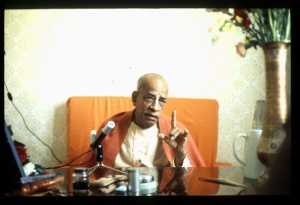CC Madhya 4.123 (1975): Difference between revisions
(Vanibot #0027: CCMirror - Mirror CC's 1996 edition to form a basis for 1975) |
(Vanibot #0020: VersionCompareLinker - added a link to the Version Compare feature) |
||
| Line 2: | Line 2: | ||
<div style="float:left">'''[[Sri Caitanya-caritamrta (1975)|Śrī Caitanya-caritāmṛta (1975)]] - [[CC Madhya (1975)|Madhya-līlā]] - [[CC Madhya 4 (1975)|Chapter 4: Śrī Mādhavendra Puri's Devotional Service]]'''</div> | <div style="float:left">'''[[Sri Caitanya-caritamrta (1975)|Śrī Caitanya-caritāmṛta (1975)]] - [[CC Madhya (1975)|Madhya-līlā]] - [[CC Madhya 4 (1975)|Chapter 4: Śrī Mādhavendra Puri's Devotional Service]]'''</div> | ||
<div style="float:right">[[File:Go-previous.png|link=CC Madhya 4.122 (1975)|Madhya-līlā 4.122]] '''[[CC Madhya 4.122 (1975)|Madhya-līlā 4.122]] - [[CC Madhya 4.124 (1975)|Madhya-līlā 4.124]]''' [[File:Go-next.png|link=CC Madhya 4.124 (1975)|Madhya-līlā 4.124]]</div> | <div style="float:right">[[File:Go-previous.png|link=CC Madhya 4.122 (1975)|Madhya-līlā 4.122]] '''[[CC Madhya 4.122 (1975)|Madhya-līlā 4.122]] - [[CC Madhya 4.124 (1975)|Madhya-līlā 4.124]]''' [[File:Go-next.png|link=CC Madhya 4.124 (1975)|Madhya-līlā 4.124]]</div> | ||
{{CompareVersions|CC|Madhya 4.123|CC 1975|CC 1996}} | |||
{{RandomImage}} | {{RandomImage}} | ||
==== TEXT 123 ==== | ==== TEXT 123 ==== | ||
<div class="verse"> | <div class="verse"> | ||
:ayācita-vṛtti | :ayācita-vṛtti purī--virakta, udāsa | ||
:ayācita pāile | :ayācita pāile khā'na, nahe upavāsa | ||
</div> | </div> | ||
| Line 18: | Line 17: | ||
<div class="synonyms"> | <div class="synonyms"> | ||
ayācita-vṛtti—accustomed to avoid begging; purī—Mādhavendra Purī; virakta—unattached; udāsa—indifferent; ayācita—without begging; pāile—if getting; | ayācita-vṛtti—accustomed to avoid begging; purī—Mādhavendra Purī; virakta—unattached; udāsa—indifferent; ayācita—without begging; pāile—if getting; khā'na—he eats; nahe—if not; upavāsa—fasting. | ||
</div> | </div> | ||
Latest revision as of 17:28, 27 January 2020

A.C. Bhaktivedanta Swami Prabhupada
TEXT 123
- ayācita-vṛtti purī--virakta, udāsa
- ayācita pāile khā'na, nahe upavāsa
SYNONYMS
ayācita-vṛtti—accustomed to avoid begging; purī—Mādhavendra Purī; virakta—unattached; udāsa—indifferent; ayācita—without begging; pāile—if getting; khā'na—he eats; nahe—if not; upavāsa—fasting.
TRANSLATION
Mādhavendra Purī avoided begging. He was completely unattached and indifferent to material things. If, without his begging, someone offered him some food, he would eat; otherwise he would fast.
PURPORT
This is the paramahaṁsa stage, the highest stage for a sannyāsī. A sannyāsī can beg from door to door just to collect food, but a paramahaṁsa who has taken ayācita-vṛtti, or ājagara-vṛtti, does not ask anyone for food. If someone offers him food voluntarily, he eats. Ayācita-vṛtti means being accustomed to refrain from begging, and ājagara-vṛtti indicates one who is compared to a python, the big snake that makes no effort to acquire food but rather allows food to come automatically within its mouth. In other words, a paramahaṁsa simply engages exclusively in the service of the Lord without caring even for eating or sleeping. It was stated about the six Gosvāmīs: nidrāhāra-vihārakādi-vijitau. In the paramahaṁsa stage one conquers the desire for sleep, food and sense gratification. One remains a humble, meek mendicant engaged in the service of the Lord day and night. Mādhavendra Purī had attained this paramahaṁsa stage.